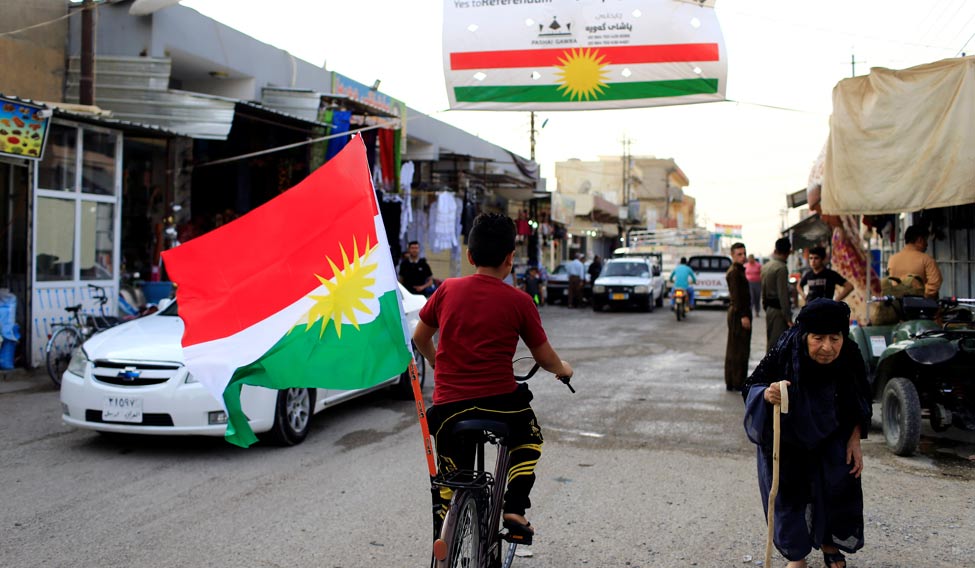The controversial Kurdistan referendum on independence has taken place defying international opinion. The referendum, though non-binding, can trigger an explosive situation in the Middle East, shattering the regional security and peace. The referendum was held despite international pressure amid fears that it might trigger fresh conflicts with Iraq, Iran and Turkey.
 Arun Mohanty
Arun Mohanty
Kurds are the largest ethnic group who were left without a state when Britain and France, the colonial powers that won the second World War, carved up Ottoman empire regions. Roughly 30 million ethnic Kurds were left scattered, primarily in four countries–Iraq, Iran, Turkey and Syria.
The 5.5 million Kurds of Iraq, which is a small faction of the present 40 million Kurdish population of the world, are reported to have overwhelmingly voted in favour of independence. Turkmen and Arab groups living in Iraq boycotted the referendum.
Turkey, Iran and Syria have huge Kurdish populations. Not surprisingly, these countries have opposed the Kurdistan referendum as it can spread the virus of separatism among millions of Kurds living in those states.
Iraq's supreme court has declared the referendum null and void. Iraq has called to cease direct oil trade with Kurdistan, demanding to bring all airports and border posts in the rebellious region under Baghdad’s control.
Turkey’s president Recep Erdogan has threatened to impose military as well as economic sanctions against Kurdistan regional government for conducting the referendum. Kurdistan’s oil sector that accounts for 80 per cent government revenues, would be worst hit by Turkey’s threat to stop oil supplies from Kurdistan to the outside world
Iran has cancelled all to and fro flights to Kurdistan. Teheran and Ankara, home to millions of Kurds, vehemently oppose Kurdistan independence fearing spread of terrorism to their territory. Iran supports Shia groups that have been ruling Baghdad, holding key political and security positions in Iraq since US-led invasion that toppled Sadam Hussain’s regime in 2003.
US has affirmed its traditional duplicity regarding Kurdistan, using Kurds in its fight against ISIS but opposing Kurdistan’s full independence, saying “the cost of independence would be too high for all countries of the region”. European Union, too, has expressed its opposition to Kurdistan independence.
Russia is the only major power which has not opposed the referendum, indirectly demonstrating solidarity with the cause of independence of Kurdistan. Russia’s economic stakes in Kurdistan are pretty high since Russian energy major Rosneft has invested nearly 4 billion dollars there. Traditionally, Russians have harbored sympathy for Kurds ever since Soviet days.
Israel is the only country which has expressed full and enthusiastic support to the Kurdistan referendum. Reacting to the referendum, Iraqi Vice-President Nouri al-Maliki has said Baghdad will not tolerate establishment of what he called “another Israel" in the region. Arab league has also opposed the referendum. Many observers believe the referendum, in line with long-pursued US-Israeli plan, is designed to split regional states and redraw the borders of the region.
Masud Barzani, head of the Kurdistan regional government, worried about international pressure, says "We are not in a hurry to declare independence". He assured the international community that the referendum is not designed to redraw the borders. "We will conduct dialogue with Iraq after the referendum and will give them 1 to 2 years in order to formulate good neighborly relations", he said. It is clear, the referendum gives a mandate to Kurdistan authorities to negotiate the secession of the oil-producing region from Iraq. Wide spread protests were reported from different regions of Iraq against the referendum. In any case, the controversial referendum looks like a step towards independence of Kurdistan, and can act as catalyst for explosion of the situation in the region.





